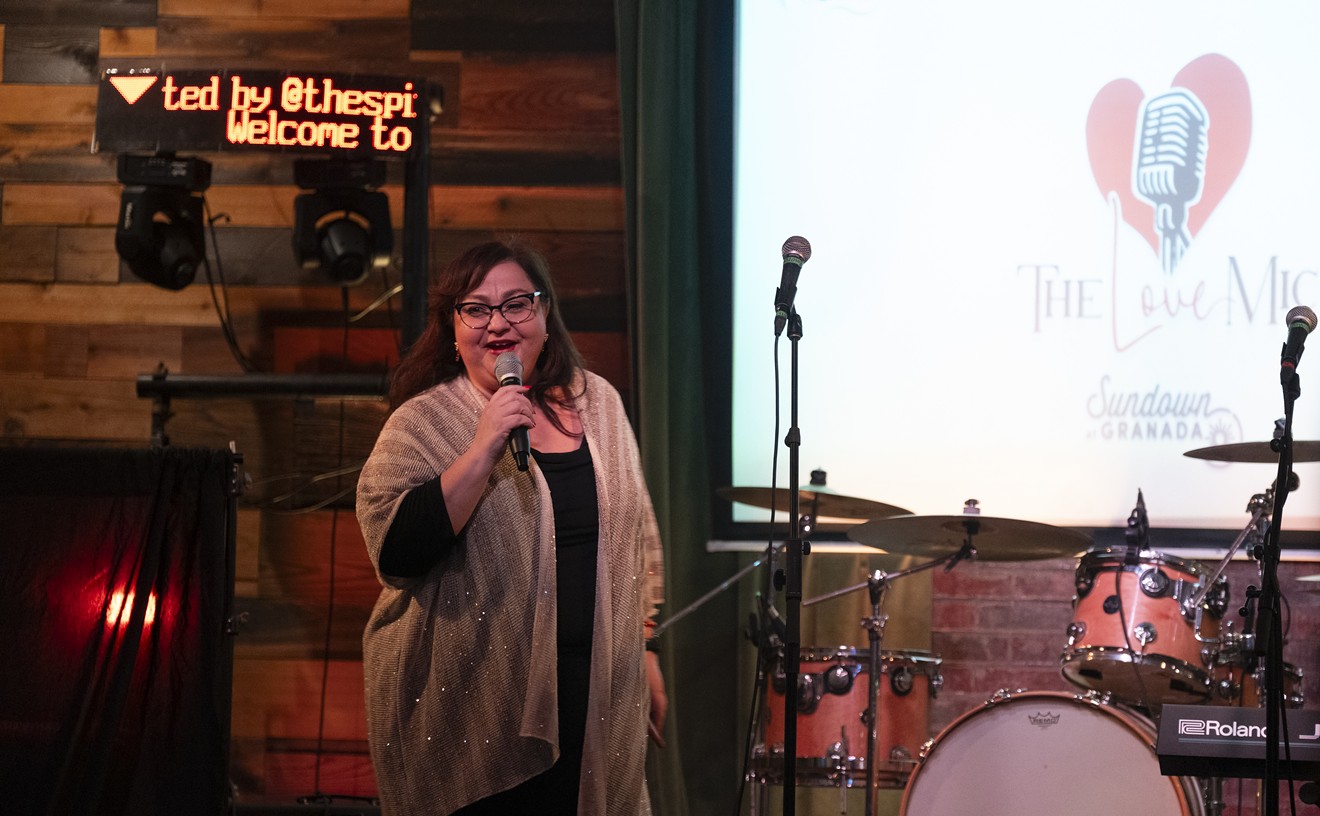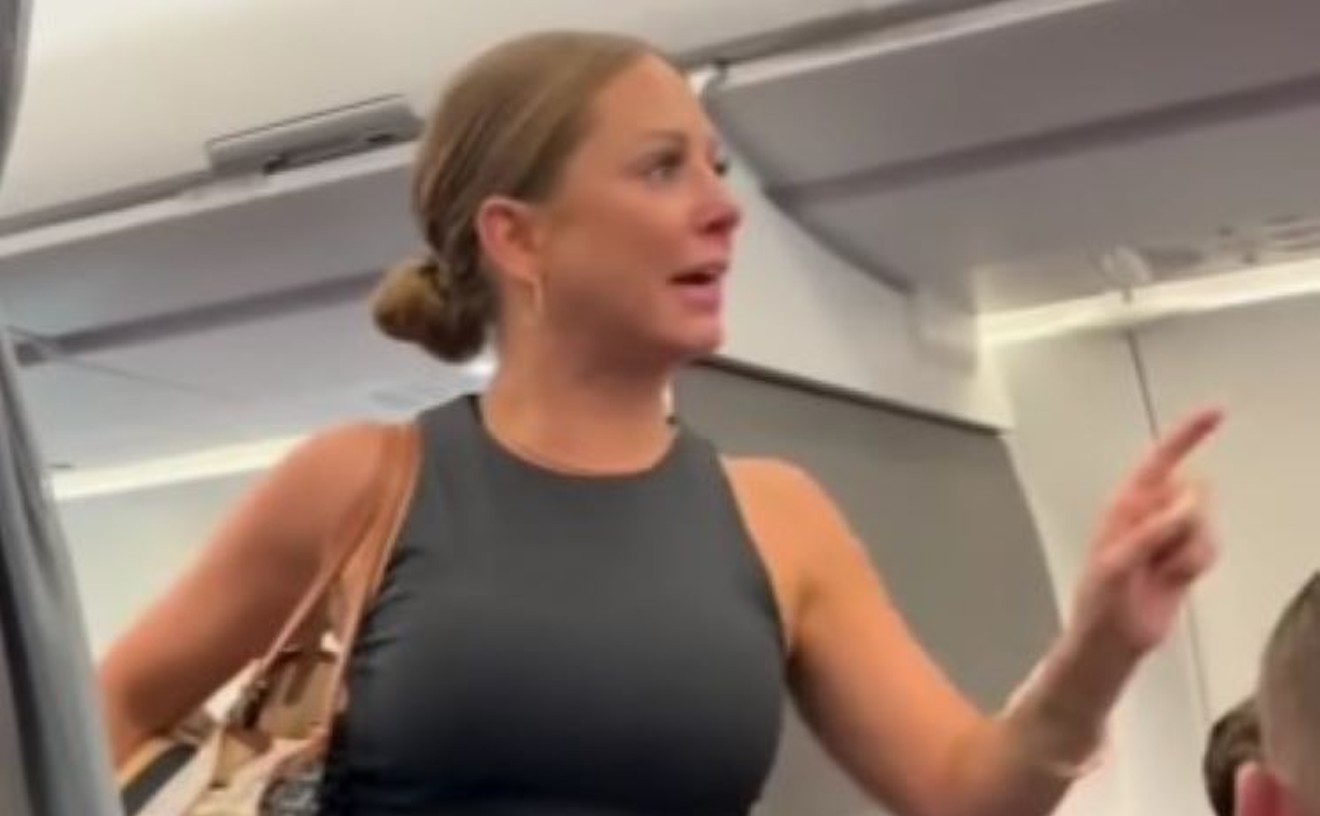A New Generation of Dallas Theater Embraces a Do-It-Yourself Attitude
On a Monday night last September, a gaggle of verbose, bright-eyed young people dressed in miniskirts, jeans and tennis shoes filled with the backyard of the Oak Cliff literary watering hole The Wild Detectives. With little warning and at a great volume they began to tell jokes and sing poetry to...
By Lauren Smart
August 10, 2015
[
{
"name": "Air - MediumRectangle - Inline Content - Mobile Display Size",
"component": "18855504",
"insertPoint": "2",
"requiredCountToDisplay": "2"
},{
"name": "Editor Picks",
"component": "17105533",
"insertPoint": "4",
"requiredCountToDisplay": "1"
},{
"name": "Inline Links",
"component": "18349797",
"insertPoint": "8th",
"startingPoint": 8,
"requiredCountToDisplay": "7",
"maxInsertions": 25
},{
"name": "Air - MediumRectangle - Combo - Inline Content",
"component": "17105532",
"insertPoint": "8th",
"startingPoint": 8,
"requiredCountToDisplay": "7",
"maxInsertions": 25
},{
"name": "Inline Links",
"component": "18349797",
"insertPoint": "8th",
"startingPoint": 12,
"requiredCountToDisplay": "11",
"maxInsertions": 25
},{
"name": "Air - Leaderboard Tower - Combo - Inline Content",
"component": "17105535",
"insertPoint": "8th",
"startingPoint": 12,
"requiredCountToDisplay": "11",
"maxInsertions": 25
}
]
On a Monday night last September, a gaggle of verbose, bright-eyed young people dressed in miniskirts, jeans and tennis shoes filled the backyard of the Oak Cliff literary watering hole The Wild Detectives. With little warning and at a great volume they began to tell jokes and sing poetry to about 65 people, all of whom were quickly intoxicated with the performance, or was it the craft beer?
It didn’t matter that the words were written centuries before by Shakespeare, a man who would be shocked to learn his writing has since been relegated to high school English classes and stilted recitations by well-groomed actors. What mattered was the experience; the audience felt something rarely felt in a Dallas theater — the joy of discovery. The magic of theater. The spell was quickly cast over all of young Dallas. The first audience of a few dozen grew to hundreds by the next performance. When they performed A Midsummer Night’s Dream recently, they had two sellout crowds, one at their home base, Wild Detectives, and the other at Community Beer Co., where the audience appeared more at home in a frat house than on the aisle ao a theater house. Clearly, these actors were onto something, and their energy is infectious. Less than a year later, the theater landscape in Dallas is ablaze with young talent sporting a do-it-yourself attitude.
“We wanted to create a community for one night, an experience that everyone was a part of,” says Katherine Bourne, one of the founders of Shakespeare in the Bar. “And now it’s exciting to see everything that’s happening and how much overlap and collaboration there is.”
Bourne wanted to start Shakespeare in the Bar after spending a summer in Chicago, where she found herself inspired by Backroom Shakespeare Project, which is exactly what it sounds like. She recruited Dylan Key, who had directed her in Jailbait for Dallas Actor’s Lab, and her former classmate from Southern Methodist University, Alia Tavakolian. (Key will direct Bourne again in A Night Alive at Undermain Theatre this fall.) All three were hitting the post-college, mid-20’s slump when the day job stops cutting it as a way for a creative person to find fulfillment.
“We knew we wanted to work on a project together,” Key says. “As an artist, all you want is to be able to play in public and for people to come see it. I’m not sure we ever would’ve predicted how successful we have been so quickly.”
Surprising as the response may have been to the young people involved, they were filling a long-empty gap in the theater scene. For the first time in a long time in Dallas, actors were taking plays off the stage and meeting an audience where they already were: the bar. Within six months, another feisty group of actors announced a project called Bar Politics, which is Josh Kumler’s hyper local spin on news satire programs like The Daily Show.
It wasn’t just bars ripe for the theater picking. To Chris McCreary’s mind, theater could exist everywhere. After graduating from SMU in 2011, he moved to Los Angeles where he worked for a casting agent and quickly grew disillusioned with the industry. He was very invested in creating his own opportunities, so he grabbed a few actors he knew from college and rehearsed three Chekov sketches in his apartment for a show he was going to produce in an art gallery.
“It was about doing the work, using text you knew was really good, and using really good actors,” McCreary says. “We were rehearsing in my living room and it was some of the best acting I’d ever seen. That that could occur in my living room made me think I was on to something.”
This was the impetus for House Party Theatre, a group of actors, directors and writers who don’t wait for the ideal space to produce work. With McCreary leading, they steer their original work and more recognizable plays anywhere they can. One of their first shows was Annie Baker’s The Aliens in the backyard of a house; more recently, the company produced Dallas-based Brigham Mosley’s Vultures in the Basement Gallery in Oak Cliff. Plus, they host a party with performances of some kind, whether theatrical or musical, nearly every weekend.
“We throw events that happen to have theater and bands,” says McCreary. “It takes the pressure off the theater to be the thing to make you money. People love going to events. You don’t need to be a theater person to appreciate really good theater or writing.”
Perhaps what these young companies are offering is unequivocal respect for their audience. Meeting them in bars, throwing parties, surprising them with good work. Not demanding attention, but earning it, without the pretense of erecting a third wall.
These are all tenets of Mosley’s work, which he honed as a solo performance artist and playwright in NYC, where he lived for a few years after graduation. When he and his partner made the decision to return to Dallas, he was excited about the possibility of working with many of his former classmates from SMU and newfound colleagues. Through social media he knew people were creating their own opportunities like fight director Jeffrey Colangelo, who created Prism Co. with classmate Katy Tye. Or Adam A. Anderson, who acts at Jubilee Theatre and is carving a path as a theater and event producer and graphic designer.
Now, Mosley says, he just wishes he felt as though he could stay forever, which he knows isn’t possible. For him and many of his peers, their time in Dallas has an always looming deadline spelled out in three letters: MFA. While SMU has a well-regarded master’s in acting, there are no equivalent degrees for play-writing or directing. It’s something Mosley, Key and many others recognize will eventually lure them away from the city.
Kelsey Leigh Ervi faces a similar dilemma. She's a graduate of Baylor University who works as an artistic and marketing associate at WaterTower Theatre and a freelance director and actor around the city. (She is onstage in Mr. Burns: A Post-Electric Play at Stage West in Fort Worth.) When she first reluctantly moved to Dallas a little more than three years ago, she was surprised to find so many things to be excited about. But she also recognizes the pull to eventually cast a larger net.
“It’s part of my artistic growth and it would be great if it could happen here,” Ervi says “But I think people who leave and come back bring new, bigger perspectives.”
Another problem many young people face is a shortage of experienced mentors. Companies and more experienced actors and directors do step up to the plate, and many people lend hands, says Key, who works full-time at Undermain Theatre under the mentorship of Katherine Owens. But this isn’t a working city for the mid-career actor. Dallas has few teaching jobs, which means that when theater professionals decide to have children, they have to balance a day job, rehearsals at night and families. That leaves little time to invest in a younger generation. Institutions are trying to fill the gap.
In 2013, the Dallas Theater Center launched the Dallas Playwrights’ Workshop, which is led by the playwright-in-residence, Will Power. But for young playwrights, like Janielle Kastner, the returns were limited. When plans for a staged reading of her play, Ophelia Underwater, fell through, she and a group of friends once again employed a bit of bricolage.
She along with eight colleagues formed The Tribe, an adopt-an-artist group working to provide opportunities to one another. In April, the group found her a rehearsal space, actors, designers, a director and produced a reading in the Kalita Humphreys Theatre. The group, which includes Bourne, Kastner, Key, Mosley, Tavakolian, Ruben Carrazana, Alexandra Hernandez, David Price and Sarah Smith, was formed one night after a performance of Uncle Vanya by Dallas Actor’s Lab, which many of them were involved in.All of the young people writing and producing their own works in these projects are also acting or working on others' productions.
“We pulled ourselves up and found ways to share our gifts with audiences and with each other,” Key says. “I never feel like my time is wasted here.”
If the landscape is shifting, it’s not by accident. These millennial artists are embracing the zeitgeist of gritty spontaneity and an unflinching self-awareness. They’re not asking you to subscribe to a season, buy expensive tickets (most of their shows are under $10 or free); they want you to show up, have a beer and exist alongside them if only for a night. And that might be theater at its finest.
BEFORE YOU GO...
Can you help us continue to share our stories? Since the beginning, Dallas Observer has been defined as the free, independent voice of Dallas — and we'd like to keep it that way. Our members allow us to continue offering readers access to our incisive coverage of local news, food, and culture with no paywalls.
Can you help us continue to share our stories? Since the beginning, Dallas Observer has been defined as the free, independent voice of Dallas — and we'd like to keep it that way. Our members allow us to continue offering readers access to our incisive coverage of local news, food, and culture with no paywalls.

Lauren Smart
Contact:
Lauren Smart


Newsletter Sign Up
Enter your name, zip code, and email
I agree to the Terms of Service and
Privacy Policy
Sign up for our newsletters
Get the latest
Arts & Culture news,
free stuff and more!
Trending
Use of this website constitutes acceptance of our
terms of use,
our cookies policy, and our
privacy policy
The Dallas Observer may earn a portion of sales from products & services purchased through links on our site from our
affiliate partners.
©2024
Dallas Observer, LP. All rights reserved.
Do Not Sell or Share My Information
Do Not Sell or Share My Information







